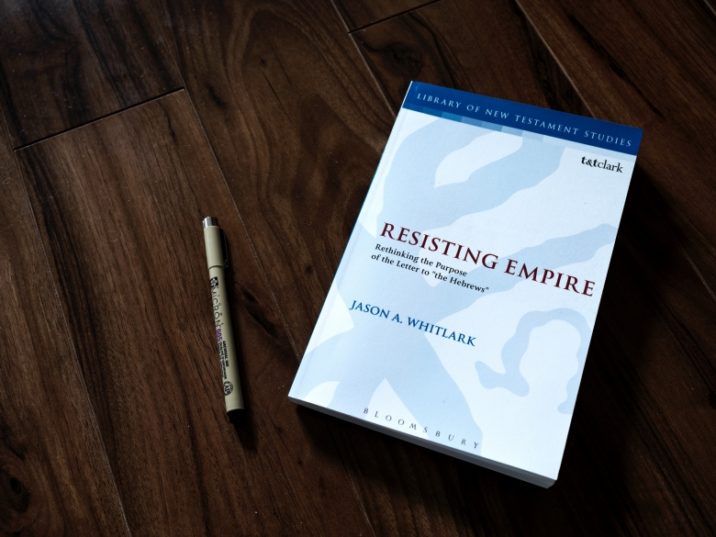
TB: What is the question you are seeking to answer about Hebrews in Resisting Empire (RE)?
JW: I was attempting to understand the social context that explained the causes of the community’s suffering for its Christian confession. Moreover, how then does Hebrews address the need for perseverance and resist the attractive alternative that would cause members of the community to give up their commitment and identification with God and his Son through their involvement with other Christ‐followers?
Imperial critical studies have made us aware of the pervasive presence of empire in the lives of Christ‐followers as the gospel message spread throughout the Roman Empire. These studies have also made us aware that resistance to empire takes place along a spectrum with open violent rebellion being just one extreme end of that spectrum. Other strategies by Christians might include redeploying imperial messages that assert the supremacy of God and his Son over against the claims of Rome. Hebrews addresses community suffering that, in part, arises from Roman imperial pressures. I was interested in the ways that Hebrews attempts to address and resist these pressures.
TB: At the time of publication of your book, you mentioned that Hebrews had been mostly ignored in the wave of Imperial resistance studies of the New Testament. Now five years later, would you say that is still the case?
JW: Scholarship on Hebrews has seen a renewed emphasis on the purpose of Hebrews to address suffering and persecution of the community addressed by the sermon. Yet exploration of the Roman Imperial context and resistance to it in Hebrews still remains an underexplored avenue in scholarship on Hebrews.
TB: I found your discussion of method particularly interesting, in that you take a cue from Charles Talbert’s proposed “reading with the authorial audience.” What does that phrase mean in practice, and is it actually possible given the historical gap between the ancient audience and modern‐day readers?
JW: The method employed in my book is an attempt to lessen the historical gap between the modern readers and the original audience of Hebrews. The authorial audience is the audience that the author anticipated would receive his communication. This audience is constructed from considering the larger historical and social contexts of the audience. We can construct this audience from consideration of both relevant textual and material culture. Constructing this audience sensitizes us to the ways such an audience would have heard a text like Hebrews. The audience of Hebrews experienced its Christian commitment in the first‐century world that was ruled by Rome. I attempted to make a reasonable case for locating the audience in the imperial capital post‐70 CE, though not all my arguments depend upon this since Roman rule and propaganda extended beyond the confines of the capital city. Thus, any study of Hebrews should take into account the rule of Rome when thinking about how the audience, anticipated by the author of Hebrews, would have received his “word of exhortation.”
TB: What are “rhetorical expectations,” and how do those factor into your argument regarding Hebrews?
JW: Besides the Roman Imperial context of the audience, that audience was also part of a world where rhetoric was central to public life. It was central to education. There was an extensive and dynamic classical rhetorical tradition in the Greco‐Roman world. This tradition gives us a very helpful meta‐discourse on how one would write and speak in particular situations. It helps us to understand what an audience might anticipate when hearing a speech. What kinds of topics would the author use to make his or her arguments? How might the author arrange his or her discourse? In the case of this book, how might an author be expected to critique authorities, especially absolutizing authority? Rhetorical studies have been fruitfully applied to Hebrews demonstrating the author’s rhetorical sophistication. This study looks at an overlooked—but commonly practiced—aspect of ancient rhetoric, namely, figured speech/critique.
TB: Finally, what is the greatest impact you could imagine your book having on the church today and into the future, both in regards to its understanding of Hebrews and the lessons therein?
Hebrews is a majestic and disturbing Christian speech that calls its audience to perseverance in its Christian identity amidst powerful counternarratives and varying levels of pressure to quit the community, whether that is shaming, confiscation of property, imprisonment, torture, or threat of death. Hebrews takes those pressures head-on by both putting forward the better cosmic hope the audience has in Jesus and strongly warning them against abandonment of that hope. He calls the community to watch over one another and to continue to love one another with good deeds.
By putting Hebrews in dialogue with Roman imperialism, I think Western Christians can be better sensitized to a covenant faithfulness that does not worship the powers of this age. Also, many Christians throughout the world continue to deal with the kinds of “imperial” pressures (shame, confiscation, imprisonment, torture, death) that the audience of Hebrews experienced. While Hebrews still calls them today to faithfulness that looks to Jesus Christ as the author and perfecter of faith, it calls us to weigh our own allegiance and commitment to the hope God gives us in Christ. Moreover, it calls to us to prayer for and solidarity with those Christian brothers and sisters who are suffering in some of the same ways as the audience of Hebrews.

Whitlark’s book, Resisting Empire, is part of the 29-volume T&T Clark LNTS (2016) series, which can currently be bid on Pre-Pub, only on Logos.
]]>




